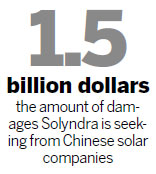
Solyndra's lawsuit against some Chinese solar panel makers over the firm's bankruptcy has raised some questions, with at least one industry analyst calling its intent "political".
Solyndra, a California-based renewable energy firm that received a $535 million government loan, is seeking $1.5 billion in damages from Suntech Power Holdings, Trina Solar and Yingli Green Energy Holding. The firm alleged that the Chinese companies engaged in "attempted monopolization, conspiracy, predatory pricing" and other tactics in an aim to destroy Solyndra, according to the complaint filed in federal court.
This came after the US Commerce Department affirmed anti-dumping duties against Chinese solar firms on Oct 10, ruling that their production was made artificially cheap because of unfair subsidies from the Chinese government.
Suntech called the allegations from Solyndra "baseless".
"It is obvious that this lawsuit is a misguided effort by Solyndra to find scapegoats for its failure to commercialize its technology at a competitive price point," E. L. "Mick" McDaniel, Suntech America's managing director, said in an e-mailed statement.
Both Trina and Yingli said they will "vigorously defend" themselves against the allegations in their press releases.
Some solar analysts have doubted Solyndra's business plan for years. Peter Lynch, who has worked for more than 30 years as an independent analyst, said he did not see how Solyndra would succeed. The solar panels produced by Solyndra would be easy to mount on a flat roof with no roof penetrations, but they were just too expensive to produce, he said.
"I think the industry needs to innovate and to take risks. Solyndra was potentially a good idea that may have gone on too long after data said it could not work. But innovation is the lifeblood of any industry, and solar is no exception," Lynch told China Daily.
Solyndra's unique cylindrical thin-film solar panels were costly to produce even compared to other US companies' solar panels. While most solar companies use crystalline silicon technology for their production, Solyndra was using copper indium gallium selenide.
Aaron Chew, a senior analyst at the investment firm Maxim Group in New York, said it was "doomed to fail from the start without competition from the Chinese".
"Solar needs to be competitive with fossil fuel pricing. The way Solyndra's technology worked, it was impossible the get the prices down," said Chew.
"The general perception was that that company was not going to stay in business for a long time," said M.J. Shiao, a senior analyst in solar markets for GTM Research. "They were both a technology risk in that this was a new technology," he added, "and they were a finance risk as well."
Lynch said he was surprised that Solyndra's business plan was approved by the Energy Department in the first place.
"I consulted with many money sources and I do not think that I would have approved the plan given what I know of the costs and also, because of at least two other technical reasons that I would view as serious potential problems down the road."
In 2009, Solyndra was looked upon as a prime example of the administration's stimulus bill dollars to create "green jobs". And when Solyndra went bankrupt two years later, its loan guarantee received much scrutiny. Shortly after Solyndra folded and laid off more than 1,000 employees, its headquarters was raided by agents from the Federal Bureau of Investigation. Congressional Republicans also launched an investigation related to the loan.
Republican presidential candidate Mitt Romney, who visited Solyndra's headquarters earlier this year, argued that Obama took a risk with the company using taxpayer's money that ultimately failed. During a debate in October, Romney used Solyndra to argue that the president had failed in his promise to create "green jobs".
The Center for Public Integrity and ABC News first reported on the Solyndra loan guarantee in May last year, revealing that the Energy Department had hurried to back the firm without fully vetting its economic prospects. The investigation also noted that billionaire George Kaiser, one of Obama's key supporters in the 2008 elections, was a major shareholder of Solyndra.
Under Solyndra's restructuring plan, the government might not get back its $528 million claim from the loan guarantee. According to its disclosure statement, the government is projected to recoup at most 19 percent on $142.8 million of the loan and probably nothing on the remaining $385 million.
In a Bloomberg report, Solyndra attorney Debra Grassgreen said that "all creditors, including the government, could see a full recovery from a $1.5 billion lawsuit the company filed against Chinese solar-panel makers last week".
According to Solyndra's suit, the Chinese manufacturers "employed a complex scheme, in collaboration with each other and raw material suppliers and certain lenders, to flood the United States solar market with solar panels at below-cost prices."
Lynch said that the allegations do not make sense.
"I do not think that they were aiming to destroy Solyndra since the company is not and never was a market leader. Why would you conspire against a company whose prices were already (before the dramatic price drop) much higher than your prices?" said Lynch.
Chew said the lawsuit is more "political than anything".
"The debtor of Solyndra is the US government. We may want to ask, who is sitting there orchestrating the lawsuit which comes right after the tariff announcement? The Obama administration looks very bad now."
atung@chinadailyusa.com
(China Daily 10/23/2012 page16)
